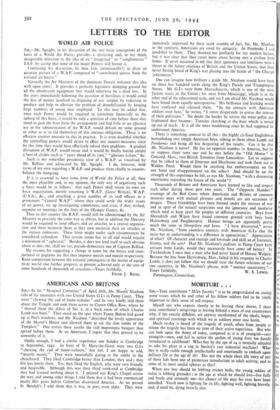WORLD AIR POLICE
LETTERS TO THE EDITOR
Sia,—Mr. Spaight, in his discussion of the two main conceptions of the basis of a World Air Force, provides a shattering and, to my mind, insuperable objection to the idea of an " integrated" or " conglomerate " I.A.F. by saying that none of the major Powers will favour it.
Continuing his discussion, he then fails (intentionally?) to draw an accurate picture of a W.A.P. composed of " contributed quotas from the national air forces."
Naturally the Air Ministers of the dominant Powers welcome this idea with open arms! It provides a perfectly legitimate dumping ground for all the obsolescent equipment that would otherwise be a dead loss. In the years immediately following the cessation of hostilities it would avoid the loss of money involved in disposing of war surplus by reduction to produce and help to alleviate the problem of demobilisation by keeping large numbers of young men employed. To this may be added that, since each Power would be required to contribute financially to the upkeep of this force, it would be only a question of time before those that stood to gain the least from the arrangement and had little or no effective say in the administration of the W.A.P. would default on some ground or other so as to rid themselves of this onerous obligation. There is no effective counter measure to this in practice. It is even doubtful whether the controlling powers would desire to effect any counter-measures since by this time they would have effectively solved their problems. A gradual disruption of W.A.P. would ensue and it would be finally buried amidst a host of clichés such as " years ahead of its time," " glorious failure," &c.
Such is my somewhat pessimistic view of a W.A.P. as visualised by Mr. Balfour and advocated by Mr. Spaight. I do, however, hold views of my own regarding a W.A.P. and produce them chiefly to counter- balance the foregoing.
If it is essential to have some form of World Air Police at all, then the most plausible and, in my opinion, the only way of organising such a force would be as follows: that each Power shall retain its own air force organisation, merely renaming it W.A.P. (Great Britain), W.A.P. (U.S.A.), &c., and attaching a given number of its staff officers to a permanent "Central W.A.P." where they could settle the wider issues of air power, set up investigating committees, and even, if they wished, organise air meetings on the lines of the Olympic Games, &c.
Thus in this country the R.A.F. would still be administered by the Air Ministry in precisely the same way as always, but in addition the Ministry would be required to send officers and air attaches to a central organisa- tion and there maintain them as they now maintain their air attaches at the various embassies. These latter might under such circumstances be considered redundant. This system seems fair to all and would require a minimum of " upheaval." Besides, it does not lend itself to such obvious abuse as does the, shall we say, pseudo-democratic one of Captain Balfour.
My reasons for suggesting a change in name for the forces and inter- national air pageants are that they improve morals and morale respectively. Keen competition between the national contingents in the matter of equip- ment would also further progress, at present achieved only at the cost of some hundreds of thousands of casualties.—Yours faithfully,
FRANK J. REISS.






























 Previous page
Previous page